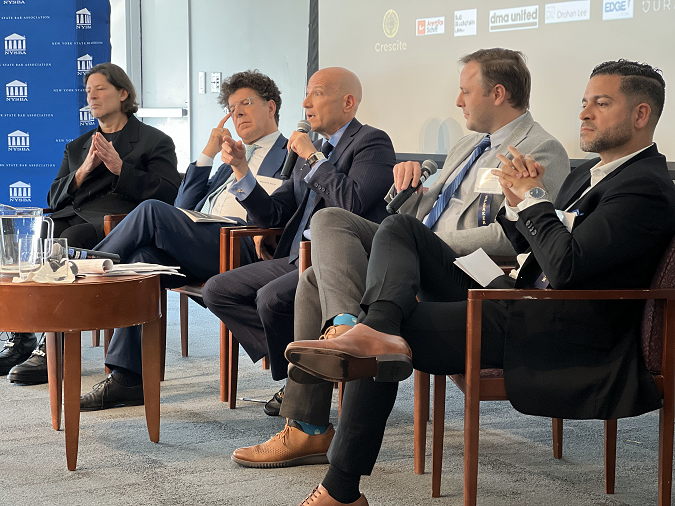Sound ‘Real World’ Principles Apply in the Web3 and Metaverse Environment
5.3.2023
 The evolving landscape of Web3 and the Metaverse presents the same concerns that are embedded in traditional law practice including privacy, copyright, contracts and anonymity. Among the biggest questions are whether new ethics rules are needed or if the principles already in place are applicable.
The evolving landscape of Web3 and the Metaverse presents the same concerns that are embedded in traditional law practice including privacy, copyright, contracts and anonymity. Among the biggest questions are whether new ethics rules are needed or if the principles already in place are applicable.
That was just one of the issues discussed by a panel throughout an hour-long breakout session during Saturday’s portion of the New York State Bar Association’s two-day conference entitled “Deep Dive Into the Metaverse: The First Global Law Symposium” that was hosted by New York University’s Metaverse Collaborative at The School of Professional Studies.
Jeremy Evans, president of the California Lawyers Association and founder of California Sports Lawyer, moderated the discussion. Steven Richman, partner at Clark Hill; Jason Chung, professor at the NYU Tisch Institute for Global Sport and counselor at Zuber Lawler; and Amanda Katzenstein, product, privacy and Web3 attorney at Salesforce, comprised the panel.
(Pictured L-R: Steven Richman, Jason Cung, Amanda Katzenstein, Jeremy Evans and NYSBA President Sherry Levin Wallach.)
All of the panelists agreed on the importance of attorneys understanding that the cases involving issues embedded in the Metaverse do not negate standard practice methods.
“Just because you are dealing in the Metaverse, contracts are contracts and you need to be attentive to documentation and writings, and the basic principles,” said Richman. “A best practice for clients who are attempting to do business in the Metaverse is that you need to still be aware of traditional concepts. If you have an avatar and it’s an extension of you, whether it’s your agent or whether it’s your alter ego, it could be you; and once you turn your machine off, back in the real world, you may have liability. Law still matters.”
Chung affirmed that thought and added that when people are operating in the Metaverse they are not always thinking about potential legal implications.
“Just because something happens online does not mean it turns into a magical box where laws don’t apply,” said Chung. “One of the things that always comes up is ‘we made a deal’ or a smart contract came into play but ultimately jurisdictional matters still matter, laws still matter and where everything gets executed still matters.”
Katzenstein said the Metaverse presents a unique issue because the anonymity the spaces provides raises moral concerns.
“There are a lot of ethical issues. So many people in the Metaverse are anonymous and it can be used for fraud or money laundering purposes,” said Katzenstein. “How do you know who your client is? How do you judge conflicts when everyone is anonymous? When do you break confidentiality in cases of potential money laundering?”
Anonymity also causes a tension between privacy and security because users in the Metaverse at times want to operate freely without being beholden to a central authority, but at the same time, want to have safeguards in place so they may perform transactions with confidence.
“That is a central distinction and problem we are dealing with in real time right now because everything sounds great,” said Chung. “‘I can do whatever I want, nobody can track me and I’m beholden to nobody,’ but of course we’ve seen what happens when places go under or fraud happens online and then generally people start thinking insurance is a good thing.”
Client confidentiality also remains a key component for any mediation that may potentially be done in a Metaverse environment, just as it would be in a traditional in-person setting.
“In the real world, you can take a person aside but in the Metaverse you have to ensure that you can have that confidentiality and that you can keep an eye on things,” said Richman. “When I first started, I was told never to talk in the elevator and never to talk in the restroom. Now you are in the Metaverse, you have to understand the technology and understand how you can communicate.”
Chung emphasized that it is vital for attorneys to have a clear understanding of the digital world before they embark on practicing in it. They need to onboard clients properly and have a clear engagement letter, along with any other mechanisms that would apply in a traditional relationship.
“You have to figure it out, you have to spend the time,” said Chung. “You can’t just rely on the tech companies to just make a ready-made solution for you because ultimately the person purchasing our services, they are not the ones with licenses, [attorneys] are, and so we have to be diligent and know what tools we are using.”
Go here to register and access this program on-demand.






